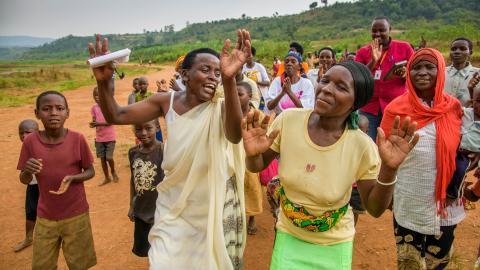
International Women's Day
Water, sanitation and hygiene (WASH) services empower women and families to thrive.
- Clean water close to home saves time that women can spend on livelihoods or other productive uses
- Safe household toilets protect women from harassment and abuse
- Women have more time and money when their children are healthy and not suffering from WASH-related diseases
Women and girls are disproportionately affected by poor WASH access.
- Women and children spend 125 million hours each day collecting water (WHO)
- Women and girls living without a toilet spend 266 million hours each day finding a place to go (WaterAid)
- Women and children bear the primary responsibility of water collection (WHO/UNICEF)
- Women and girls often spend up to 6 hours each day collecting water (UN Water)
- In Africa and Asia, women and children walk an average of 3.7 miles a day just to collect water (UN, UNESCO)
Celebrating women's leadership
At World Vision, we are proud to have tenacious women leaders working diligently in the field to support their fellow women to have access to clean water and safe sanitation.
There are women like Liddah, a technical advisor for World Vision Malawi's drilling team. When a village in Malawi receives a well that brings clean water, the women and children who spend hours every day carrying water are often the ones who benefit the most. But it is usually men who design and build the water systems. In Malawi, Liddah is breaking those norms. Read her story here.
Or meet Preety, a girl who helped bring a toilet to every household in her village in India. Read her story here.
Transforming generations
Since 2016, World Vision has provided more than 11 million women and girls with access to clean water close to home.
When a woman gets clean water, it doesn't just change her life, it changes her daughter's life, which then changes her granddaughter's life. Clean water brings a generational impact.
More to be done
What does the future look like for women? Achieving parity may come slowly, but if one woman no longer has to spend 6 hours a day fetching water, then that can start a positive chain reaction that can lead to stronger gender parity in society.
At World Vision, we are committed to providing sustainable clean water, sanitation and hygiene services for everyone, everywhere we work, by 2030. Read more about this commitment in our WASH Business Plan.